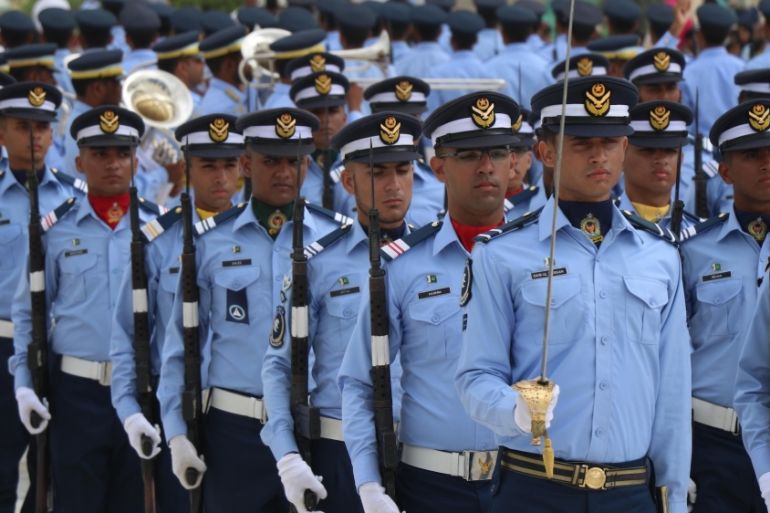Dear Pakistanis, this Defence Day, please stop celebrating hate
The Pakistani military has propagated a false narrative about the 1965 war that justifies its oversized role in society.

Every year Pakistan celebrates Defence Day on September 6. On this day, the army reminds the Pakistani public that it defeated the Indian forces in the 1965 war and highlights the sacrifices it made in defending Pakistan’s borders from “a surprise attack from India”.
Ceremonial military parades are held across the country where senior military officials make fiery speeches and soldiers march alongside armoured vehicles mounted with the latest missile technologies while fighter jets perform an airshow in the skies above.
Keep reading
list of 4 itemsRwanda genocide: ‘Frozen faces still haunt’ photojournalist, 30 years on
Underground tunnels found in Israel from Jewish revolt against Romans
Lost in Orientalism: Arab Christians and the war in Gaza
The media wing of the army also asks national media outlets to run promotional videos that pay tribute to the armed forces. Religious and extremist groups, known to have friendly ties to the military, also come out in the streets, holding rallies glorifying Pakistan’s army.
But efforts to militarise the Pakistani population and reinforce a narrative of victory in the 1965 war is not limited to Defence Day. This narrative is written into official Pakistani textbooks that teach students, both at public and private schools, how India committed an open aggression against Pakistan to facilitate its expansionist intentions and attacked on the night of September 6.
Although Pakistan had far less military and economic resources compared with India, the armed forces of Pakistan, filled with the spirit of jihad, forced an enemy many times bigger to face a humiliating defeat – a Pakistani textbook reads.
However, there is little truth to these claims; Pakistan did not win this war. It agreed to a ceasefire with India after it realised it may lose. Also, it is absolutely false that India started this war.
The evidence of this first came to light when, in the early 2000s, General Mehmood Ahmed published a book bursting the myths around the 1965 war. The general was tasked by the army to investigate the 1965 war, and he chose to go public with his findings, which highlighted how the Pakistan Army launched a secret military operation into Indian-administered Kashmir in 1965, and India responded in turn.
According to Ahmed’s account, the Pakistani military was eventually overwhelmed by Indian troops and forced to withdraw, thus failing to achieve the objective of taking over Kashmir. The book goes on to explain in detail that only a select few generals knew about the secret military operation, that the Pakistan army miscalculated the Indian response and that this version of events is kept away from the public.
After the book came out, it mysteriously disappeared from bookstores. Today it is almost impossible to find a copy of it in Pakistan.
But why does the Pakistani army insist so vehemently on propagating a false historical narrative and ensuring that the truth does not get out? It is quite simple: having a perpetual enemy next door helps the military stay relevant and justify its enormous budget that burdens the country’s economy.
It also shields the military from any criticism it may face for regularly intervening in politics, having multibillion-dollar businesses, and allegedly supporting Kashmiri and Afghan fighter groups. It poses as the saviour of the country and elevates itself above the state and the need for accountability.
Last year, when I pointed out the Pakistani military’s false glorification of the 1965 war on social media, I was told by a military official not to “disrupt” their media campaign. Then in January this year, armed men tried to kidnap me in Islamabad. Luckily, I managed to escape and was forced to relocate to France.
Today, as Pakistanis once again celebrate Defence Day, we should ask ourselves whether we should continue believing in engineered narratives.
Preaching hate, celebrating a false victory and promoting narrow-mindedness will only further exacerbate one of the core issues faced by Pakistan today: growing extremism.
The first step towards reversing this trend should be accepting the truth about the 1965 war. We must remember that incitement and conflict will not bring progress and development to the country, only peace will.
The views expressed in this article are the author’s own and do not necessarily reflect Al Jazeera’s editorial stance.
